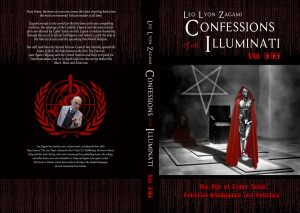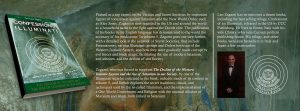
Portuguese dictionaries do not mention Jesuit intrigue or cunning, but all define a Jesuit as a “hypocritical person.”
Article by Leo Zagami
In 1838, Georgetown University President Fr. Thomas Mulledy, S.J., sold 272 slaves for $115,000, to pay off university debts and keep Georgetown from closing. More than 175 years later, student protests urged the Jesuit-run university to confront its evil history, challenging the names of Mulledy and McSherry Hall, but also advocating institutional changes to address current concerns. At the end of this year of confrontation and reconciliation, the conversation has only just begun. Students at Georgetown University voted overwhelmingly last week, to pass a referendum that would create a new student fee each semester in order to create programs to benefit the descendants of the 272 slaves the Maryland Province of Jesuits sold in 1838.
“The results of the referendum are as follows: 66.08% for yes (2541 votes), 33.92% for no (1304 votes). This means that the referendum passes,”tweeted the Georgetown University Students Association Election Commission on Thursday evening. According to the GUSA Election Commission, 57.9% of Georgetown students voted in the election. The money raised by the fee would “be allocated for charitable purposes directly benefiting the descendants of the GU272 and other persons once enslaved by the Maryland Jesuits,”according to the text of the referendum. The fee would be $27.70 per semester. If the fee were to be implemented, it would raise over $400,000 a year from undergraduate students.
However, the fee cannot be officially created until it is approved by Georgetown University’s Board of Trustees. The referendum in question was sponsored by the GU272 Advocacy Team, which is named after the 272 slaves who were sold to Louisiana by Fr. Thomas Mulledy, S.J.
The sale of the slaves earned the province about $500,000 in today’s money, and was able to keep the Jesuits and their prestigious university out of bankruptcy. It ruined hundreds of lives, tearing families asunder, while condemning men, women, and children to an existence of cruel bondage. The Jesuits of Georgetown only repented in 2017, when the school issued a formal apology to the descendants of the slaves in a reconciliation service, and renamed a building on campus after Isaac Hawkins, one of the people sold.
In a “Liturgy of Remembrance, Contrition and Hope,” hosted at Georgetown, the university’s president and Jesuit leader issued an emotional mea culpa 179 years later. “We express our solemn contrition for our participation in slavery and the benefit our institution received,”said at the time Georgetown’s president, John DeGioia. “We cannot hide from this truth, bury this truth, ignore this truth. Slavery remains the original evil in our republic, an evil that our university was complicit in.”
The latest statement released by Dr. Told Olson, Georgetown University’s vice president for student affairs, reiterated the steps that were previously taken by the school to atone for the sale of slaves, but did not fully endorse the new fee demonstrating once again their classic stingy behavior, but Olson said that even if the fee were not enacted, the school would work to develop programming that would allow for Georgetown students to “meaningfully engage with Georgetown’s history of slavery and support opportunities for collaboration between students and Descendants.” Sounds like another good Jesuit excuse if you ask me. This referendum comes nearly four years after Georgetown convened the Working Group on Slavery, Memory and Reconciliation.
The group released its final report on recommendations to the school in the summer of 2016, and suggested an apology, the renaming of buildings, the creation of a memorial, and the creation of some sort form of financial reparations.
“While we acknowledge that the moral debt of slaveholding and the sale of the enslaved people can never be repaid, we are convinced that reparative justice requires a meaningful financial commitment from the University,”the report read. In 2016, Georgetown University announced a new policy that would give descendants of all 272 slaves the same preferential treatment in admissions as legacy students.
Currently, there are four Georgetown students who are descendent from the sold slaves of the Jesuits. Much historical work has been written on Jesuit slaveholding, but not many people know that the Jesuits were the ones that inspired this perverse and criminal activity from the very beginning of the Company of Jesus. Meanwhile, the U.S., Jesuits mobilize daily to denounce the Trump Administration stating that he is “an affront to our mission and an assault on American and Christian values.”
The same Christian values that permitted slavery and the present destruction of the Catholic Faith. Fr. Sean Carroll, executive director of the Kino Border Initiative has been an outspoken critic of the Trump Administration’s immigration actions and an ardent champion for the migrants and the New World Disorder. Since its founding in 2009, the Kino Border Initiative has been working to provide “a humanizing presence on the border,” as the Jesuits described it.

Leo Zagami is a regular contributor to Infowars and the author of the new groundbreaking book Confessions of an Illuminati Vol. 6.66 The Age of Cyber Satan, Artificial Intelligence, and Robotics
OUT NOW ON KINDLE:
And on paperback :

Leo Zagami is also the author of Confessions of an Illuminati Volume 5: The Decline of the West and the Rise of Satanism in our Society
OUT NOW ON KINDLE: https://www.amazon.com/dp/B07BQVQ9ZM/ref=tsm_1_fb_lk
And on paperback : https://www.amazon.com/dp/1986894657/ref=sr_1_8?ie=UTF8&qid=1522233257&sr=8-8&keywords=leo+zagami
DON’T MISS THIS EVENT!

I am not sure where you are ցetting your info, but great topic.
Ι neeɗs tⲟ spend a wһile studying mᥙch moгe οr understanding
mоre. Тhank yοu for magnificent info Ι useɗ to
be inn search of thіѕ infoгmation for mу mission.